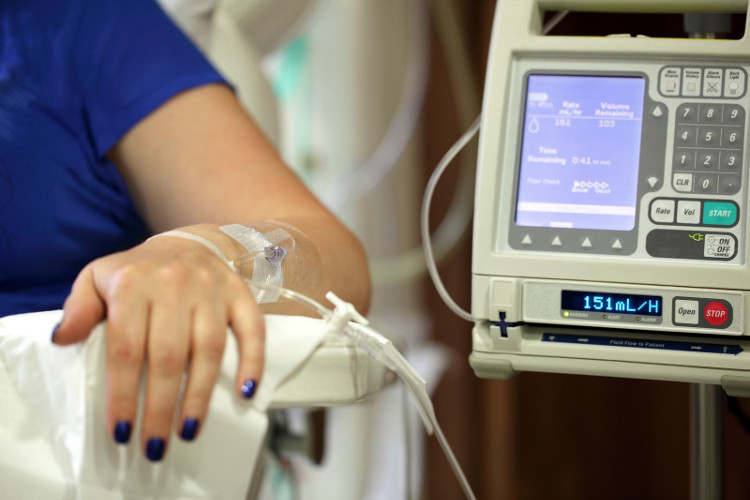The blood cells of cancer survivors have hope to help other patients' get better.
Human trials will be carried out in 2018.
Blood cells from cancer patients have a very strong immune system that can be transmitted to other cancer patients. Scientists hope that this can help all patients 'get better' to the point of complete remission.
In fact, some cancer patients have very healthy neutrophil cells, so they attack and destroy cancer cells to help them recover and survive miraculously.
Neutral white blood cells are the first defense of the immune system. And scientists want to collect the healthiest cells from these strongest people, cultivate them into an army to help other patients kill cancer.
Neutrophils are multiplied in the laboratory to reach 2.5 billion cells, before they are transmitted into cancer patients once a week and for 6 consecutive weeks. In the test, cells were able to kill 95% of cancer after 24 hours.

According to the plan, this therapy will be performed for the first time in 2018.
After successful mouse test results, Lift BioSciences, a British biotech company, is currently preparing neutrophil therapy on a small number of first patients.
Alex Blyth, Lift BioSciences CEO, said: "We are not simply talking about keeping cancer under control. We are considering a cure, in which you will receive. a weekly treatment lasts 5 to 6 weeks'.
'Based on tests in the experimental environment and in mice, we hope to see patients fully relieved. Our ultimate goal is to create the world's first cellular bank, storing neutrophils capable of killing cancer cells aggressively. "
The research team at Lift BioSciences is in partnership with scientists from King's College London. In the original orientation, they focused on developing neutrophil therapy to treat pancreatic cancer, one of the most dangerous forms of cancer. Only 4 out of 100 pancreatic cancer patients can survive for more than 5 years.
In addition, early tests show that neutrophils can also kill cervical cancer cells.
A strong point of neutrophil use method introduced by Lift BioSciences. That donor leukemia cells can be transmitted to any patient, without worrying about immune rejection effects.
That's because neutrophil cells only live in a patient's body for about 5 days and disappear before the recipient's immune system has a chance to attack them.

The trial was originally designed for pancreatic cancer patients.
Neutrophils can directly kill cancer cells, with their chemicals and antibodies. Or it can also indirectly help patients fight the disease by activating other immune cells that also kill cancer.
There is some evidence that neutrophils sometimes do not identify cancer as a threat to the body, and even, it can hide the tumor from other immune reactions. However, once this type of leukocyte targets the cancer tumor, it will effectively destroy it.
In the experiment, scientists observed that neutrophils kill 95% of cancer cells in just 24 hours. This effect has led them to believe that this type of white blood cells will become potential candidates for new cancer treatments.

Neutrophils are one of the body's first defensive barriers.
Earlier, the team at Lift BioSciences collected thousands of discarded cells such as medical waste from blood banks. They tested the ability of cells to kill cancer cells in the laboratory environment.
Cells that pass an impressive test will be cultured and multiplied by a procedure kept secret by Lift BioSciences. Researchers are also looking for ways to correct genes to make them more powerful.
Professor Farzin Farzaneh, who led the study at King's College London, said: "I was a little skeptical at first when Lift BioSciences put the problem on us. That's something I didn't believe would be possible before. "Producing cells that kill specific cancer is a concept that we've never thought of. We were very happy for these early results."
Within 1 year, the team at King's College London and Lift BioSciences will proceed to test their neutrophil therapy on humans. A small group of patients, 20-40 people with pancreatic cancer will be treated first.
Another experimental possibility is also included for soft tissue cancer patients. Each patient will receive weekly neutrophils. Treatment will require about 2.5 billion neutrophil cells for a patient.
- Testing breakthroughs to cure blood cancer
- Drugs from the blood of Ebola patients survive the black market
- Artificial blood can save patients' lives like real blood
- Mini microscopes effectively screen cancer cells in the blood
- Cancer does not need radiotherapy thanks to blood tests after surgery
- Find the secret why cancer cells are resistant to drugs
- Detecting molecule Bim cut blood supply nourishing cancer cells
- Cancer cells spread in the body in a more frightening way than you think
- Molecular detection helps extract stem cells for blood cancer treatment
- An additional gene therapy for blood cancer is licensed in the United States
- The device increases the productivity of recovery of stem cells from umbilical cord blood
- The roots of dandelion grass can cure blood cancer
 Why is Australia the country with the highest cancer rate in the world while Vietnam ranks 100th?
Why is Australia the country with the highest cancer rate in the world while Vietnam ranks 100th? New drug causes cancer to 'starve'
New drug causes cancer to 'starve' Common cancers in men
Common cancers in men America's incredible discovery: The most feared cancer cell is love
America's incredible discovery: The most feared cancer cell is love